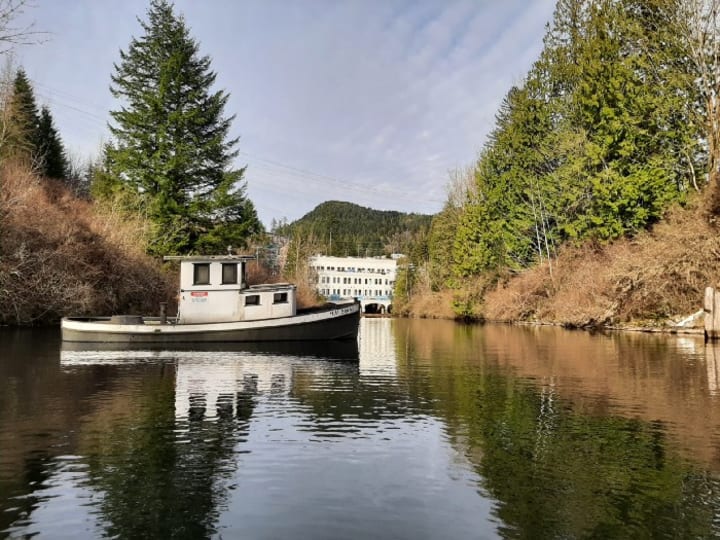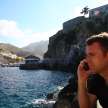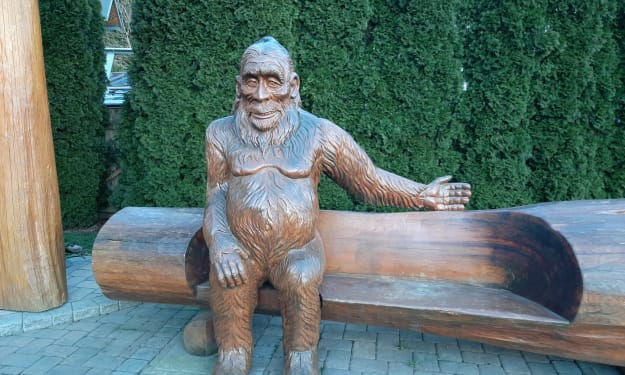Ghosts of the Green World: A Paddle Through BC’s Past
A maiden voyage on Hayward Lake

“Hey!”
My voice bounced back from the corroded concrete of the low bridge above the water. Not the best echo I’ve ever heard, but something. A reflection of sound like the reflection of light shining in a thousand tiny pockets of the water’s surface. And if light was as slow as sound, or if our eyes were quicker, the whole world would echo whenever we looked at it.
“You okay?”
“Yeah, fine. I’m just gonna stay behind you. That way you’ll run into things before I do.”
“Oh, thanks.”
It wasn’t my wife’s first time kayaking. That was years ago, on the coast of Spain. Since then, we’ve explored some local lakes in rickety rentals. The virus-inspired nationwide shortage of recreational equipment meant I wasn’t able to buy a boat of my own until September last year. And A doesn’t like the cold. I’ve spent the winter by myself out on the lakes near my home, the mobile light and the deep silence possibly the only thing that’s kept me semi-sane through a full year of house arrest.
But now the weather is getting warmer. Slowly, steadily, the mercury expands in its glittering glass tube. When our local Costco started selling kayaks, A swooped in and bought one. She’s seen how much it does for me. Still, the first rusty paddle in her new boat can’t help but make her nervous.
I don’t normally kayak in places like this
I don’t have to. If you’re willing to pay the enormous financial cost of living in British Columbia, the reward is ready access to pristine wilderness. My favorite lakes are wide and wild, surrounded by monster-haunted forests and mountains crowned by clearcuts. You don’t take a cheap boat on its maiden voyage on a lake like that.
So instead, we drove to Hayward Lake in Mission, just outside Vancouver. Unlike so many of the lakes in the area, this one doesn’t go back to the Ice Age, when the grinding glaciers crumpled the land like a losing lottery ticket on their way to the sea. This used to be a valley. Before they dammed the river to build a hydroelectric plant, they logged what is now the bottom of the lake. Peering down over the side of a kayak, you can still see flat-topped stumps lurking just below the green water.
That was one hundred years ago, when towns in British Columbia were sprouting like mushrooms in the dank forest. People came here to seek their fortune or to escape their past, outrunning the echoes that pursued them to the edge of the world. Men with hands harder than axe heads cut down the trees and drove spikes into the earth and raised a plant to power the growing town.
With its endless mountains and waterways, British Columbia has used sustainable energy from the beginning. Hydroelectric power meets ninety-five percent of the province’s energy needs even today, which must make the house-poor millionaires feel good as they charge up their Teslas.

Passing under the bridge, we paddled our way into the tailrace of the old power plant.
The blocky white building sat at the end of the waterway, its tall windows reflecting water as the water reflected them. Everything contains everything else. Built in 1911, the power station has been replaced by a more modern facility, and is maintained the way it was in the early twentieth century. Visitors can go inside and see the colossal humpbacked machinery, the giant generators and Pelton wheels and the quaintly analog mass of dials and wheels that controlled it all.
And outside, in the tailrace, a towboat sits at anchor. Abandoned and covered in streaks of bird shit, it sways back and forth, its steel hull occasionally scraping the muddy bottom of the channel. The MV Shirley used to patrol the lake, gathering up floating logs and other debris and dragging it to shore. Now, it drifts in the lazy water, plastered with warning signs telling people not to climb aboard. No matter how tempted they are.
Boats are made to float
And that’s what they do until someone stops them. They don’t even need passengers. In 2013, a Japanese fishing boat washed up on the shores of British Columbia after two years spent drifting alone and unmanned across the Pacific since the 2011 tsunami. The same disaster saw a Harley-Davidson motorcycle wash up in Canada, the property of a man who lost three family members to the killer wave that hit Japan. And in Alaska, the US Coast Guard had to open fire on a Japanese fishing trawler that had become a hazard to shipping.
Of course, ghost ships are nothing new. In 1775, an English trading ship called the Octavius attempted the Northwest passage through Arctic Canada. The ship made it, but the crew didn’t, found frozen to death when the pilotless ship reached Greenland from China.
In 1854, the abandoned HMS Resolute was found drifting off Canada’s frozen north coast. Its weatherbeaten timbers were used to make the desk that sits in the Oval Office today.
The SS Baychimo was abandoned in Alaska in 1931 and proceeded to drift around the ice — patrolled sea for the next 40 years. She was last seen frozen in pack ice in 1969. In 2006, the Alaskan government began looking for the ship, but she still has not been found.
Like the Russian cosmonauts talked about by some of the Internet’s more wild-eyed residents, floating flash-frozen through the endless vacuum above us. Doomed to circle the sun forever, like the rest of us lost mariners. Like the Baychimo, drifting in and out of sight through the wavy haze of melting snow. Like the MV Shirley, slowly circling her iron anchor while the ghosts of loggers and power plant workers stare out unseen from the shining glass windows.
The past keeps coming back. The old key once again rattling in the door. The familiar footstep you thought you’d forgotten but recognize the moment you hear it unexpectedly one night. The ghosts and the ghost ships and the dead trees still rising from the lake, their roots lost in the blackness below while crows call from the upper branches and receive an echo of their own. Is the past our echo, trailing out behind us and growing fainter all the time? Or are we the echoes, bouncing back and forth from one reflective surface to another, lake to bridge and bridge to lake until our energy finally dwindles and we become as flat and silent as the tailrace where the old boat sags?
Our boats glided through the water toward the beach
The reflections of birds swooped underneath us, chasing drowned clouds while we soared above them. Abandoned, maybe even our humble kayaks might drift south over the glittering water and find their way to the rolling Fraser River, flecked with gold dust and ocean barges and cold dead salmon. And from there, the sea. The two of them carried on a single current, knocking hollowly against each other to not feel so alone as they drift out under the stars and disappear from this story into the forgetful, merciful ocean.
But not yet. Not today. The sea and the stars will have to wait.
Misjudging the water’s depth, I stepped out of my kayak and felt the cold lake rush in over the top of my boot. Swearing softly, I waited for A to follow me to shore so we could carry the boats back to our car. The maiden voyage of her new kayak, and hopefully the first of many. The present already vanishing into the past, becoming memory by the second like the bird tracks on the beach’s wet sand and the echo still ringing in ears sharper than ours.
In the city and outside it, the past keeps coming back. But sometimes it’s worth shouting just so we can hear our voices fade away.
© Ryan Frawley 2021.
About the Creator
Ryan Frawley
Towers, Temples, Palaces: Essays From Europe out now!
Novelist, entomologist and cat owner. Ryan Frawley is the author of many articles and stories and one novel, Scar, available from online bookstores everywhere.






Comments
There are no comments for this story
Be the first to respond and start the conversation.